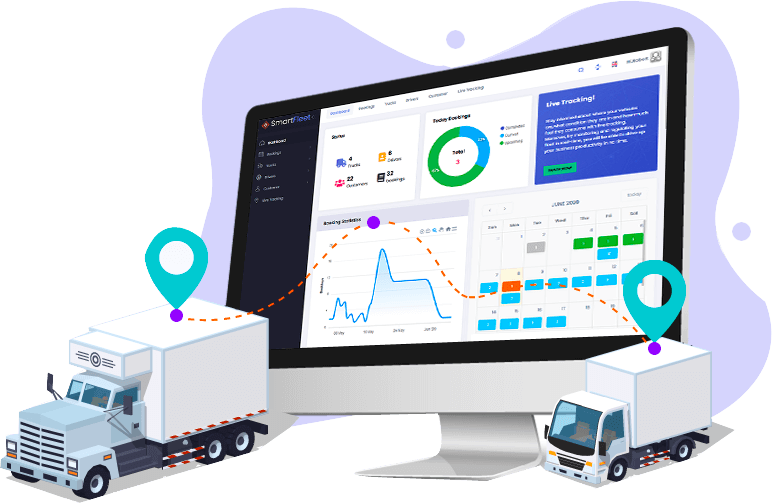
Truckers play an essential role in the smooth running of global supply chains, and technology is revolutionizing how they manage their daily workflows. Keeping pace with technological advancements means truckers can stay connected with partners, customers, suppliers, and shippers no matter where their travels take them.
With improved access to information on routes, cargo loads, and real-time notifications from dispatching software programs, today’s truckers have more control over their workloads than ever before. In this article, we look at the ways new technologies are transforming the way truck drivers get goods from point A to B. From easier scheduling, real-time tracking systems, and enhanced communication channels between drivers and warehouse managers.
Exploring the Impact of Technology on Truckers’ Roles in the Supply Chain

The trucking industry is a fundamental part of the supply chain Road Closures that ensures that goods are delivered to their destination on time. In recent years, the industry has experienced significant technological advancements that have transformed the way truckers conduct their operations. One of the most significant impacts of technology is the ability to locate available parking spaces within a trucking parking lot, increasing driver efficiency and reducing costs associated with unauthorized parking.
Additionally, technology has made it possible for truckers to access real-time data on traffic conditions, weather patterns, and road closures, all of which help to prevent unnecessary delays and improve on-time performance. However, these technological advancements have also presented challenges for truckers, such as reducing the need for some roles in the supply chain and increasing the demand for others. Fleet management solutions have revolutionized the way companies oversee their vehicles, providing comprehensive tools for monitoring, maintenance scheduling, and optimizing routes.
As technology continues to evolve, it is essential to explore the impact on truckers and their roles in the supply chain to ensure that they are adequately equipped to navigate and leverage it to their advantage.
The Benefits of Advanced Connectivity for Truckers and their Employers
Technology has dramatically improved connectivity for truckers, allowing them to stay connected and informed no matter where their travels take them. With the use of specialized software applications, truckers can access real-time data on their cargo loads, fuel consumption, route optimization, and other critical information that helps them make informed decisions while on the road.
This connectivity benefits the drivers and their employers, who can monitor and manage their fleet more efficiently and cost-effectively. Real-time tracking systems also improve communication between truckers and warehouse managers, reducing manual paperwork and streamlining the delivery process.
Moreover, connected devices such as tablets and smartphones have made it easier for truckers to communicate with their teams, customers, and suppliers, providing real-time updates on delivery schedules and any potential delays. This improved connectivity not only saves time but also reduces costs associated with miscommunication or errors in documentation.
Understanding the Improvements Brought by Smart Fleet Management Solutions

One of the most significant advancements in technology for truckers is the implementation of intelligent fleet management solutions. These systems use advanced algorithms and data analytics to optimize route planning, fuel consumption, and overall fleet efficiency. By utilizing real-time data from GPS tracking and onboard sensors, these solutions can detect potential issues such as vehicle breakdowns or traffic delays and suggest alternative routes or schedules to ensure timely deliveries.
In addition, intelligent fleet management solutions also provide valuable insights into driver performance, helping trucking companies identify areas for improvement and increase overall efficiency. These solutions have proven to be highly beneficial for both truckers and their employers, increasing productivity while reducing operational costs.
Unlocking Greater Efficiency and Productivity through Telematics
Another essential technology for truckers is telematics, which combines telecommunications and informatics to provide real-time data on vehicle location, performance, and driver behavior. Telematics systems use onboard devices such as GPS trackers, cameras, and sensors to collect data that can be analyzed to improve safety, efficiency, and productivity.
With telematics, truckers can track their driving behavior and receive feedback on how to improve fuel efficiency or reduce the risk of accidents. For employers, telematics provides data on fleet performance, enabling them to make informed decisions about maintenance schedules and routing optimization. This technology has proved crucial in reducing operational costs, enhancing safety measures, and promoting overall efficiency.
Promoting Safety through Real-time Data Monitoring and Communication

Beyond improving efficiency and productivity, technology has also had a significant impact on promoting safety for truckers. Real-time data monitoring and communication systems have allowed for quicker response times in the event of an emergency or accident. Additionally, with advanced tracking and monitoring systems, employers can ensure that their drivers are adhering to safety regulations such as speed limits, rest breaks, and proper vehicle maintenance.
Technology also promotes safety through improved communication between truckers and other drivers on the road. With features such as real-time traffic updates and alerts, truckers can make informed decisions to avoid potential hazards or accidents. It not only benefits truckers but also contributes to overall road safety.
Examining New Opportunities for Autonomous Vehicle Use Among Professional Drivers
Advancements in technology have also sparked discussions about the potential use of autonomous vehicles in the trucking industry. While still in its early stages, autonomous trucks have shown promise in reducing driver fatigue and increasing safety on long-haul routes. However, this technology is not meant to replace professional drivers but rather to complement their roles and allow them to focus on other tasks, such as route planning and cargo management.
As this technology continues to evolve, it is essential to consider the potential impact on truckers and ensure that they are adequately trained and equipped to work alongside autonomous vehicles. Additionally, regulations and safety measures must be carefully implemented to ensure a smooth transition into this new era of transportation.









